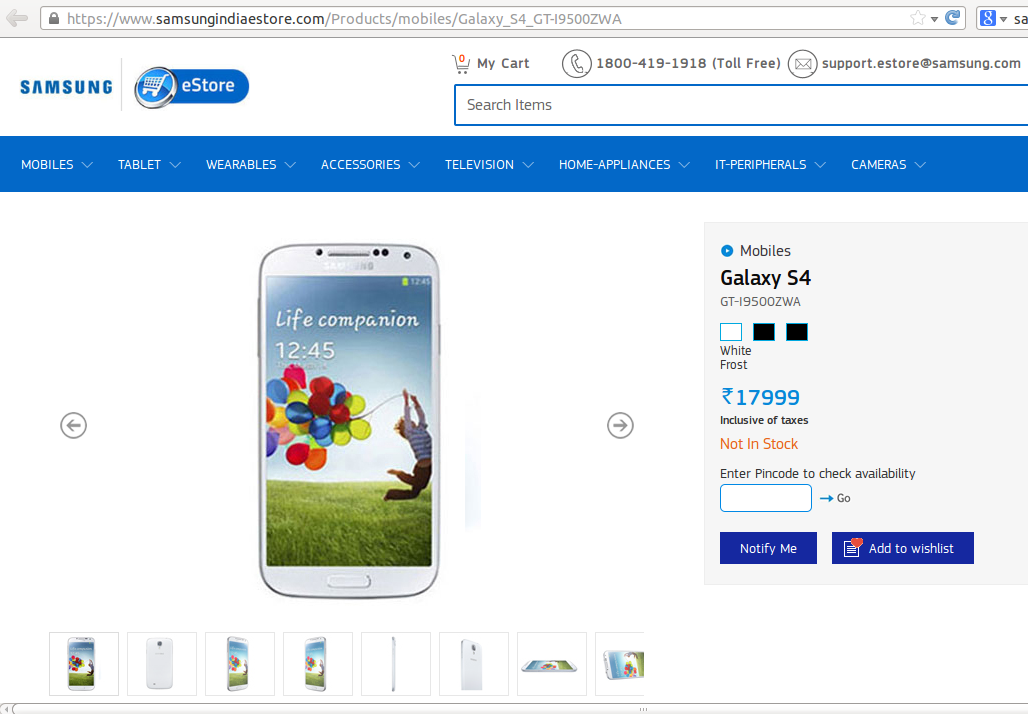People mostly call me as the window shopping guy who will visit emarketplaces like Amazon.in, Flipkart.com, Snapdeal.com, eBay.in, Shopclues.com etc. but still visit a physical store to make that final purchase.
Yeah call me old-fashioned but there are very good reasons why I still choose a retail store over online shopping.
Let me give you one example right away.
A promotional mail that landed in my Gmail inbox today carries a subject line that says Samsung Galaxy S4 available at Rs 17,999 @Amazon.
I click for more details and see a promotional offer by Amazon.in that says "You Save Rs 23,501" i.e. a huge discount of 57% with a Buy Now box just below it.
After clicking the Buy Now box, I am taken to the Amazon.in webpage that says maximum retail price (MRP) of the smartphone is Rs 23,500 and the deal price is Rs 17,999 thus giving me a saving of Rs 5,501 i.e. a 23% discount on MRP.
So my discount or the money I save buying the smartphone online is already down from 57% to 23%.
Just to be sure that the 23% saving was for real, I decided to further dig into the pricing of the smartphone on the Samsung India eStore. And what do I find there?
The Samsung Galaxy S4 smartphone is being sold on the Samsung India eStore for Rs 17,999. While it also says 'Out Of Stock' it certainly validates the fact that the smartphone doesn't cost more than Rs 17,999 and that price is inclusive of all taxes.
What started as a promise of 57% savings on Samsung Galaxy S4 smartphone came down to 23% after checking out the deal on Amazon.in. A further due-diligence on its price gives out a completely different picture, which is 'That I Was Not Saving A Single Penny' buying the smartphone from Amazon.in.
I guess being a window shopper on the various eCommerce platforms has its advantages and disadvantages. I am certainly not regretting because I see more advantages than disadvantages here :-)
Yeah call me old-fashioned but there are very good reasons why I still choose a retail store over online shopping.
Let me give you one example right away.
A promotional mail that landed in my Gmail inbox today carries a subject line that says Samsung Galaxy S4 available at Rs 17,999 @Amazon.
I click for more details and see a promotional offer by Amazon.in that says "You Save Rs 23,501" i.e. a huge discount of 57% with a Buy Now box just below it.
After clicking the Buy Now box, I am taken to the Amazon.in webpage that says maximum retail price (MRP) of the smartphone is Rs 23,500 and the deal price is Rs 17,999 thus giving me a saving of Rs 5,501 i.e. a 23% discount on MRP.
So my discount or the money I save buying the smartphone online is already down from 57% to 23%.
Just to be sure that the 23% saving was for real, I decided to further dig into the pricing of the smartphone on the Samsung India eStore. And what do I find there?
The Samsung Galaxy S4 smartphone is being sold on the Samsung India eStore for Rs 17,999. While it also says 'Out Of Stock' it certainly validates the fact that the smartphone doesn't cost more than Rs 17,999 and that price is inclusive of all taxes.
What started as a promise of 57% savings on Samsung Galaxy S4 smartphone came down to 23% after checking out the deal on Amazon.in. A further due-diligence on its price gives out a completely different picture, which is 'That I Was Not Saving A Single Penny' buying the smartphone from Amazon.in.
I guess being a window shopper on the various eCommerce platforms has its advantages and disadvantages. I am certainly not regretting because I see more advantages than disadvantages here :-)



